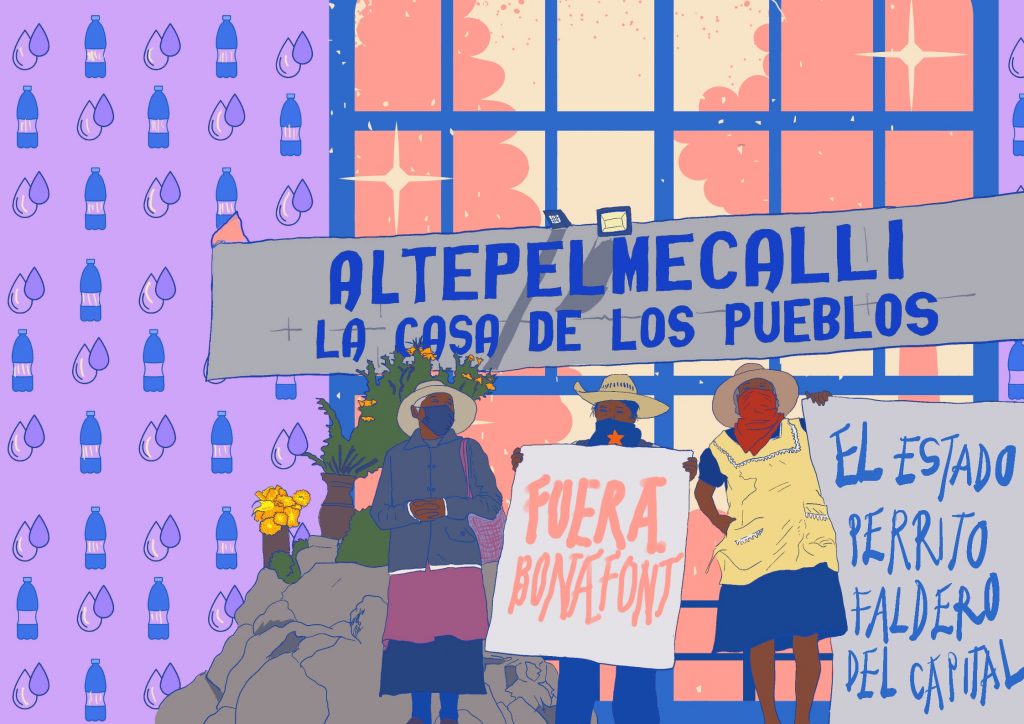
by Luis Hernández Navarro
As if it were the work of the devil looking to surface from the depths of hell, an enormous hole opened up in the farmlands of Santa María Zacatepec, Puebla. With an unstoppable appetite, the hole grew day after day. It began on May 29, 2021, with a diameter of 5 meters. In less than a day, it reached 30. Soon after it got to 100 meters. Now it is nearly 130 meters wide and 30 meters deep.
In its voracity, the sinkhole swallowed crops and the house of the Sánchez Xalamiahua family, it cracked the walls of other dwellings and swallowed up puppies Spay and Spike, who were finally rescued. Seen from above, it looked like an enormous moon crater, with openings in the walls that resemble plumbing lines. In fact, the cavity is not isolated. The demon also opened other voids beneath the earth, turning the area into a kind of gruyere cheese.
In La suave patria, (The Soft Homeland) Ramón López Velarde wrote: The Baby Jesus gave you a stable, and the devil, the worship of oil. But in Puebla it wasn’t the exploitation of black gold that the evil one bestowed, but the extraction of blue gold. That was what caused the sinkhole to open. In 1992, the modern Beelzebub gave usufruct rights of the springs to companies that set up shop in San mateo Cuanalá, in the municipality of Juan C. Bonilla, Puebla. And first a bottling plant, and then the transnational Bonafont milked them mindlessly.
Since the signing of the North American Free Trade Agreement the authorities have extended the guarantee of impunity to big business to do what they want with water resources. A public good such as blue gold has been privatized (https://bit.ly/3s1bLdD). Instead of installing potable water systems, they have facilitated its sale in plastic bottles. Three transnationals control 80 percent of this market in our country: Coca Cola (Ciel), Danone (Bonafont), and PepsiCo (E-Pura) (https://bit.ly/3gXmMqa).

With an insatiable thirst for profits, Bonafont, part of the Danone consortium, extracted one million 640 thousand liters of water a day, the equivalent consumption of a community of 18,000 inhabitants. Its ambition depleted water tables, left more than 20 communities in the municipality without vital liquid, and dug an invisible network of tunnels, caverns and subterranean holes which to a large extent, according to a study by specialists from the National Polytechnic Institute, precipitated the appearance of the sinkhole. In exchange, it received 3.28 million pesos daily.
Since 1992, the indigenous Nahuas of the region have opposed the appropriation of water. In order to stop their dissent, the state government imposed an illegitimate mayor on them. Over the years, time and again, they protested against the environmental devastation and the depletion of the artisanal wells. In 2008, they blocked the Mexico-Puebla federal highway and symbolically shut down the company. To no avail. The authorities turned a deaf ear to the protesta and sided with the transnationals.
Day by day, the situation became increasingly urgent. The wells dried up, water for planting, animals and even human consumption grew scarce. So, on March 22nd of 2021, the International Day of Water, 22 communities, organized in the Pueblos Unidos de la Región Cholulteca y de los Volcanes (United Peoples of the Choluteca and Volcano Region) shut down the plant.
This is what they were doing when the devil appeared in the sinkhole. A religious denomination congregated around the security fence of the hole to pray, to call on mortals to repent their sins, reading biblical quotes and singing biblical songs. Others, more practical, invented a holiday bread by the name of Recuerdo del socavón (Souvenir from the Sinkhole)
Only slightly more than four months later, in the face of governmental negligence, on August 8th, the 142 anniversary of the birth of General Emiliano Zapata , the indigenous peoples front occupied the plant, plugged the illegal well in which the company stored the water, and founded the Altepelmecalli community center (House of the Peoples).
The walls of the facilities were adorned with paintings by various visual artists, and all kinds of self-managed projects began to blossom: education, health, raising chickens, pigs and sheep, a community radio station, a library and other activities. Like a miracle, when its savage extraction ceased, the blue gold ceased to be scarce in houses and properties (https://bit.ly/3gXmMqa).
Altepelmecalli became a great center of meetings and gatherings inspired by the environmentalism of the poor. A true crossroads of popular resistance. It adopted as an axis of action the struggle against devastation, dispossession, oppression, exploitation, and discrimination. Movements in defense of rivers and water, against open-pit mining, gas pipelines and large hydroelectric plants were given the space to exchange experiences, and refine planes. They honored the memory of community leader, Samir Flores, murdered with impunity in Amilcingo three years ago.
The unprecedented experience of regional indigenous self-organization lasted eleven months. Under cover of darkness, on the morning of February 15th, 2022, the National Guard and state police violently evicted the communities, and returned the facilities to Bonafont.
Far from being an act of justice, the police intervention on behalf of the company is an invitation to open more sinkholes and lower more water tables. The repression against the indigenous Nahua leaves no question, in conflicts over natural resources between indigenous peoples and large companies, as to which side the bread is buttered.
This article was published in La Jornada on February 22, 2022. https://www.jornada.com.mx/2022/02/22/opinion/016a2pol
English translation by Schools for Chiapas with support and graphics from Taller Ahuehuete.
